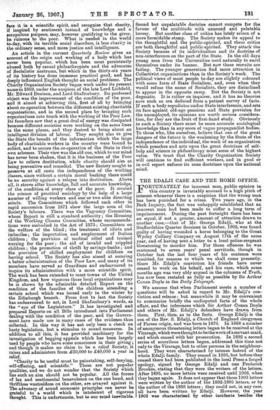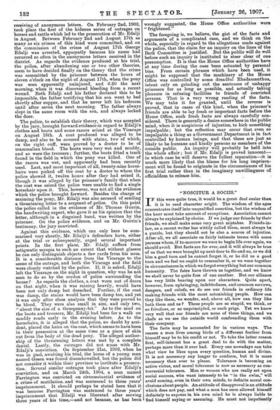THE EDALTI CASE AND THE HOME OFFICE.
FORTUNATELY for innocent men, public opinion in this country is invariably aroused to a high pitch of interest whenever there is a suspicion that the wrong man has been punished for a crime. Two years ago, in the Beck Inquiry, the fact was unhappily established that an innocent man had been made to suffer a long term of imprisonment. During the past fortnight there has been an equal, if not a greater, amount of attention drawn to another case,—that of Mr. George Edalji, who at the Staffordshire Quarter Sessions in October, 1903, was found guilty of having wounded a horse belonging to the Great Wyrley Colliery Company on August 17th of the same year, and of having sent a letter to a local police-sergeant threatening to murder him. For those offences he was sentenced to seven years' penal servitude, though in October last the last four years of his sentence were remitted, for reasons to which we shall come presently. Since Mr. Edalji's conviction his friends have never ceased to work on his behalf, and his case, which some months ago was very ably argued in the columns of Truth, has now been restated as fully as possible by Sir Arthur Conan Doyle in the Daily Telegraph.
We assume that when Parliament meets a number of questions will be asked in regard to Mr. Edalji's con- viction and release ; but meanwhile it may be convenient to summarise briefly the undisputed facts of the whole affair, and the inferences which Sir Arthur Conan Doyle and others of Mr. Edalji's defenders have drawn from them. First, then, as to the facts. George Edalji is the son of the Rev. S. Edalji, a Church of England clergyman of Parsee origin, and was born in 1876. In 1888 a number of anonymous threatening letters began to be received at the Vicarage, which were thought to be the work of a servant-maid, and which ceased with her prosecution. In 1892 a second series of scurrilous letters began, addressed this time not only to the Vicarage, but to other persons in the neighbour- hood. They were characterised by intense hatred of the whole Edalji family. They ceased in 1895, but before they ceased there had been published in the local Press a forged apology, signed by George Edalji and one Frederick Brookes, stating that they were the writers of the letters. After 1895, no more letters were received until 1903, when they began again. It does not appear that these 1903 letters were written by the author of the 1892-1893 letters, or by the author of the 1888 letters ; they could not, in any case, all have been written by Edalji. However, the year 1908 was characterised by other incidents besides the
receiving of anonymous letters. On February 2nd, 1903, took place the first of the hideous series of outrages on horses and cattle which led to the prosecution of Mr. Edalji in August. Between February 2nd and August 17th as many as six crimes of this kind were committed, and on the commission of the crime of August 17th George Edalji was arrested, apparently - because his name had occurred so often in the anonymous letters received in the district. As regards the evidence produced at his trial, the police, after abandoning one or two other theories, seem to have decided finally on the theory that the crime was committed by the prisoner between the hours of eleven o'clock on the night of August 17th, when the pony was seen apparently uninjured, and 6.20 the next morning, when it was discovered bleeding from a recent wound. Both Edalji and his father declared this to be impossible, the father testifying that his son went to bed shortly after supper, and that he never left his bedroom until after seven the next morning. The father always slept in the same room with the son, and always locked the door.
The police, to establish their theory, which was accepted by the jury, brought forward evidence in regard to Edalji's clothes and boots and some razors seized at the Vicarage on August 18th. A coat produced was alleged to be damp, and also to be covered with stains, two of which, on the right cuff, were proved by a doctor to be of mammalian blood. The boots were very wet and muddy, and so were the trousers ; further, the boots fitted a track found in the field in which the pony was killed. One of the razors was wet, and apparently had been recently used. Last, and most important of all, twenty-nine horse- hairs were picked off the coat by a doctor to whom the police showed it, twelve hours after they had seized it, though it was alleged by the prisoner's family that when the coat was seized the police were unable to find a single horsehair upon it. This, however, was not all the evidence which the police brought forward. Besides the charge of maiming the pony, Mr. Edalji was also accused of sending a threatening letter to a sergeant of police. On this point the police called in the evidence of Mr. Thomas Gurrin, the handwriting expert, who gave it as his opinion that the letter, although in a disguised hand, was written by the prisoner. On the police evidence, and on Mr. Gurriu's testimony, the jury convicted.
Against this evidence, which can only here be sum- marised very shortly, Mr. Edalji's defenders have, either at the trial or subsequently, urged several important points. In the first place. Mr. Edalji suffers from astigmatic myopia to such an extent that without glasses he can only distinguish objects a few yards from his nose. It is a considerable distance from the Vicarage to the scene of the outrage, and both the Vicarage and the field were closely watched by the police. If, it is asked, Edalji left the Vicarage on the night in question, why was he not seen to do so by the cordon of police surrounding the house? As regards the clothes, a coat worn out of doors on that night, when it was raining heavily, would have been not only damp but drenched. Further, if the coat was damp, the stains would have been damp too, and yet it was only after close analysis that they were proved to be blood. They were also small in size, and only two, "about the size of a threepenny-bit." As to the mud on the boots and trousers, Mr. Edalji had been for a walk on muddy roads early in the evening before. As to the horsehairs, it is alleged that the police, no doubt by acci- dent, placed the hairs on the coat, which seems to have been in their possession at the same time as a piece of skin cut from the body of the dead pony. The alleged author- ship of the threatening letters was met by a complete denial. Lastly, the outrages did not cease with Mr. Edalji's conviction. On September 21st, 1903, when he was in gaol, awaiting his trial, the horse of a young man named Green was found disembowelled, but the police did not consider it within their province to institute a prosecu- tion. Several similar outrages took place after Edalji's conviction, and on March 24th, 1904, a man named Farrington was convicted on circumstantial evidence of a crime of mutilation, and was sentenced to three years' imprisonment. It should perhaps be stated here that it 'was because Farrington was sentenced to three years' imprisounient that Edalji was liberated after serving three years of his time,—and not because, as has been
wrongly suggested,. the Home Office authorities were "frightened."
The foregoing is, we believe, the gist of the facts tad arguments of a complicated case, and, we think on the whole, especially in regard to the allegations made against the police, that the claim for an inquiry on the lines of the Beck Committee is justified. But the public will do well before such an inquiry is instituted to steer clear of one presumption. It is that the Home Office authorities have at any time during the case been actuated by personal bias. From certain phrases which have been used, it might be supposed that the machinery of the Home Office was controlled by some dreadful Rhadamanthus, intent only on grinding out the sentences of unhappy prisoners for as long as possible, and actually taking pleasure in refusing facilities to friends of convicted persons. That is a very wrong reading of the facts. We may take it for granted, until the reverse is proved, that in cases of this kind, when the prisoner's friends are able to lay fresh or important facts before the Home Office, such fresh facts are always carefully con- sidered. There is generally a desire somewhere in the public mind, when it is suspicious of injustice, to kick something impalpable ; but the reflection may occur that even so impalpable a thing as a Government Department is in fact controlled by human beings, and that these are just as likely to be humane and kindly persons as members of the outside public. An inquiry will probably be held into the whole affair ; but if Mr. Edalji is proved innocent— in which case he will deserve the fullest reparation—it is much more likely that the blame for his long imprison- ment will be found to originate in the circumstances of his first trial rather than in the imaginary unwillingness of officialdom to release him.























































 Previous page
Previous page